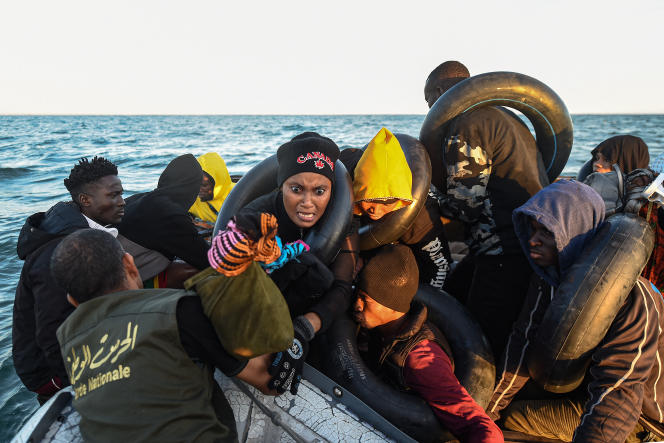Two weeks after one of the worst shipwrecks of a migrant boat in the Mediterranean, European leaders are discussing, Thursday, June 29, in Brussels, the finalization of an agreement with Tunisia intended in particular to prevent these crossings and to fight against the passers.
The European Commission hoped to conclude before this European Union (EU) summit a memorandum of understanding with Tunis to implement a ” general partnership “ including a migration component. With the aim of then extending this type of partnership to other countries in the Mediterranean region. But the discussions with Tunis, sensitive, are proving longer than expected and should resume Monday, after the great Muslim holiday of Eid Al-Adha.
The partnership, which also includes strengthening economic and trade ties and cooperation on green energy, is accompanied by financial support amounting to more than one billion euros. It was announced on June 11 during a visit to Tunis by Commission President Ursula von der Leyen, accompanied by Italian head of government Giorgia Meloni and her Dutch counterpart, Mark Rutte.
However, it raises the concerns of some Member States because of the autocratic drift of President Kaïs Saïed and the human rights situation in this country, which is in the grip of a serious socio-economic crisis. European aid is partly linked to the granting by the International Monetary Fund (IMF) of a credit of 2 billion dollars (1.83 billion euros) under negotiation, with conditions.
But, since the visit of the trio, President Saïed repeats that Tunisia will not be “the border guard” of Europe and will not comply with what he describes as “dictates” of the IMF. He refuses the reforms recommended by the Fund providing for the restructuring of more than 100 heavily indebted public companies and the lifting of state subsidies on certain basic products.
Boats, radars and cameras
In detail, the European aid announced includes a loan of up to 900 million euros, but also budgetary aid of 150 million euros and a package of 105 million euros for the management of migration for 2023.
The EU plans to deliver boats, mobile radars, cameras and vehicles to Tunisia by the summer to help it strengthen control of its sea and land borders. Increased police and judicial cooperation is planned to fight against smuggling networks.
The agreement also aims to return more easily to Tunisia nationals of this country who are in an irregular situation in the EU. The EU also funds returns “volunteers” migrants from sub-Saharan Africa from Tunisia to their countries of origin: 407 returns have been financed since the beginning of the year, according to the Commission.
Tunisia, some stretches of coastline of which are less than 150 km from the Italian island of Lampedusa, frequently records attempts by migrants, mostly from sub-Saharan African countries, to leave for Italy.
Newsletter
“The Africa World”
Every Saturday, find a week of news and debates, by the editorial staff of “Monde Afrique”
Register
Arrivals on the Italian coasts are up sharply: more than 60,000 since the start of the year (+ 133% compared to the same period in 2022), according to the UNHCR. Half of these arrivals come from Tunisia, the rest from Libya and Turkey.
“Weak idea”
The central Mediterranean – between North Africa and Italy – is also the most dangerous migratory route in the world with more than 20,000 deaths since 2014 according to the International Organization for Migration (IOM). On June 22, a week after the sinking off the Peloponnese of an old trawler from Libya which left at least 82 dead and hundreds missing, a boat of migrants leaving from Sfax in Tunisia capsized off Lampedusa, making about forty missing.
These tragedies have revived criticism from NGOs of an increasingly restrictive European migration policy and the lack of “legal channels of migration”.
Evelien van Roemburg, director of Oxfam’s European office, described the partnership with Tunisia as“flawed idea”denouncing “Europe’s attempts to outsource its migration management responsibilities”. “Experience has shown that this type of agreement does not work”she told AFP.
The EU signed a controversial migration agreement with Turkey in 2016, in the wake of the 2015 refugee crisis.
Furthermore, the EU cooperates with the Libyan coast guard, which is regularly denounced by NGOs and the UN because of the ill-treatment to which migrants intercepted at sea and forcibly brought back to Libya are subjected.
